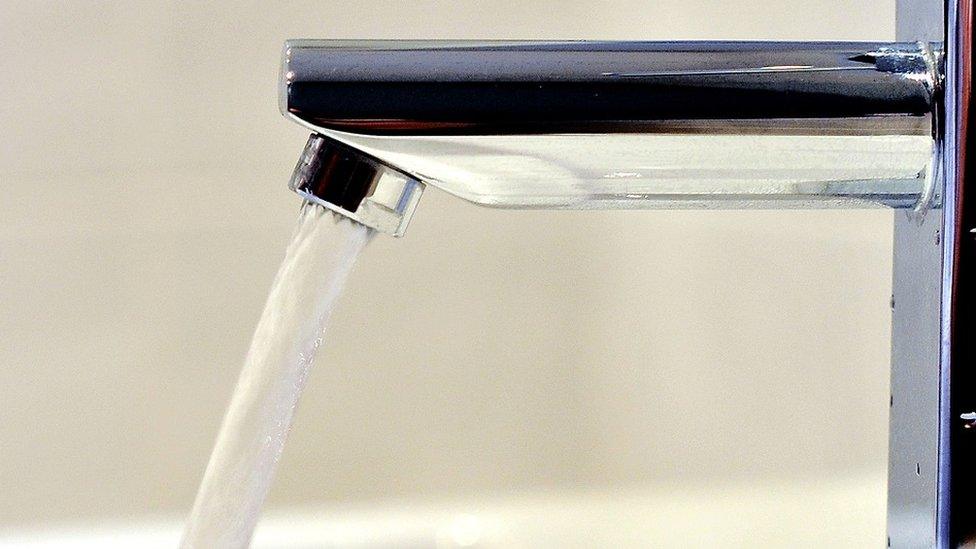Lib Dems unveil plan to turn water firms into 'public benefit companies'
- Published

The "lawless" water industry must be forced to put the environment before profits, the Lib Dems have said.
The party has drawn up a bill to relaunch the "disgraced firms" as US-style "public benefit companies".
They would not be renationalised - but the water regulator would force them to be run for the good of the environment, as well as profit, under the proposals.
It comes as the UK's biggest water firm Thames Water is in talks to secure funding as it faces collapse.
If the company cannot secure additional funding, it could be temporarily taken over by the government until a new buyer is found.
Water quality has become a major political issue, with the government and the industry facing growing calls to take more action over the discharge of raw sewage into rivers and seas.
'Scandal-ridden industry'
The industry is reportedly pushing to be allowed to increase water bills in England by up to 40% by 2030 to pay for the sewage crisis, fuelling anger over the cost of living and the amount the firms have been paying out to shareholders.
Sir John Armitt, chairman of the National Infrastructure Commission, said 40% was "probably not unrealistic".
"As a country, we have to decide what quality, what level of infrastructure we require," he told Radio 4's Today programme.
"We then have to decide whether we want to pay for it, if we can afford to pay for it, we have to look after those who (have) limited resources and therefore cannot handle extra bills easily."
The Lib Dems say they are planning to put pressure on Conservative MPs in south of England, in seats they are targeting at the next general election, to back their proposed reforms.
The party's environment spokesman Tim Farron said there was "no time to waste in ripping up this scandal-ridden industry" and his Thames Water (Public Benefit Corporation) Bill would be an "an important first step to finally turning around this sinking ship".
'Knockdown price'
In the Commons, Water Minister Rebecca Pow told MPs she could not comment on the financial position of Thames Water but the water sector as a whole was "financially resilient" - and the government had a "plan for water", external to tackle pollution.
She argued that the industry, which was privatised by the Conservatives in 1989, had increased the amount it was investing in infrastructure to deal with "sewage issues".
Firms had to pay dividends to shareholders to continue attracting investment, she argued, but the regulator Ofwat was taking action against those that did not link these payments to performance.
Meanwhile, Labour's shadow environment minister Jim McMahon said the Thames Water crisis was "the result of the Conservative Party's failed profit above public interest experiment".
He accused the party of "handing over the water industry at a knockdown price, together with the entire infrastructure serving the nation, over to private enterprise", with no safeguards for national security or bill payers.
Labour has ditched its commitment to re-nationalise the water industry and other public utilities, made when the party was led by Jeremy Corbyn.
But it has yet to spell out in detail any plans to reform the industry if it wins power.

Ben and Jerry's is among the US firms to become Public Benefit Corporations
A Labour spokesman said: "Spending hundreds of billions of pounds and taking years to untangle the ownership of the water industry is not what we're looking to do.
"But regardless of ownership status, the water industry requires a plan that delivers change and drives standards. It shouldn't be left to the public to clean up the mess or pay the price of Tory failure."
'High dividends'
Under the Lib Dem proposals, the water companies would be turned into "Public Benefit Companies", with a legal requirement to pursue environmental goals, while making no more than a "reasonable" profit. They would also have to give environmental experts a seat on their boards.
The idea is based on Public Benefit Corporations, external, which operate in 36 US states. Ben and Jerry's ice cream, which is part of Unilever, outdoor clothing retailer Patagonia and crowd funding site Kickstarter are among the companies using the public benefit model.
A Lib Dem source said adopting it for the UK water industry "would mean the insultingly high dividends paid out to overseas shareholders would drop, and instead be given to fix the sewage system" and the firms could still pay back investors but at "a slower pace".
Ms Pow dismissed the idea during the Commons debate, saying the party could not say "where the money is going to come from" to pay for it.
The Lib Dems insist their plan would not cost taxpayers anything, as it would just involve a change in the way the companies are run.